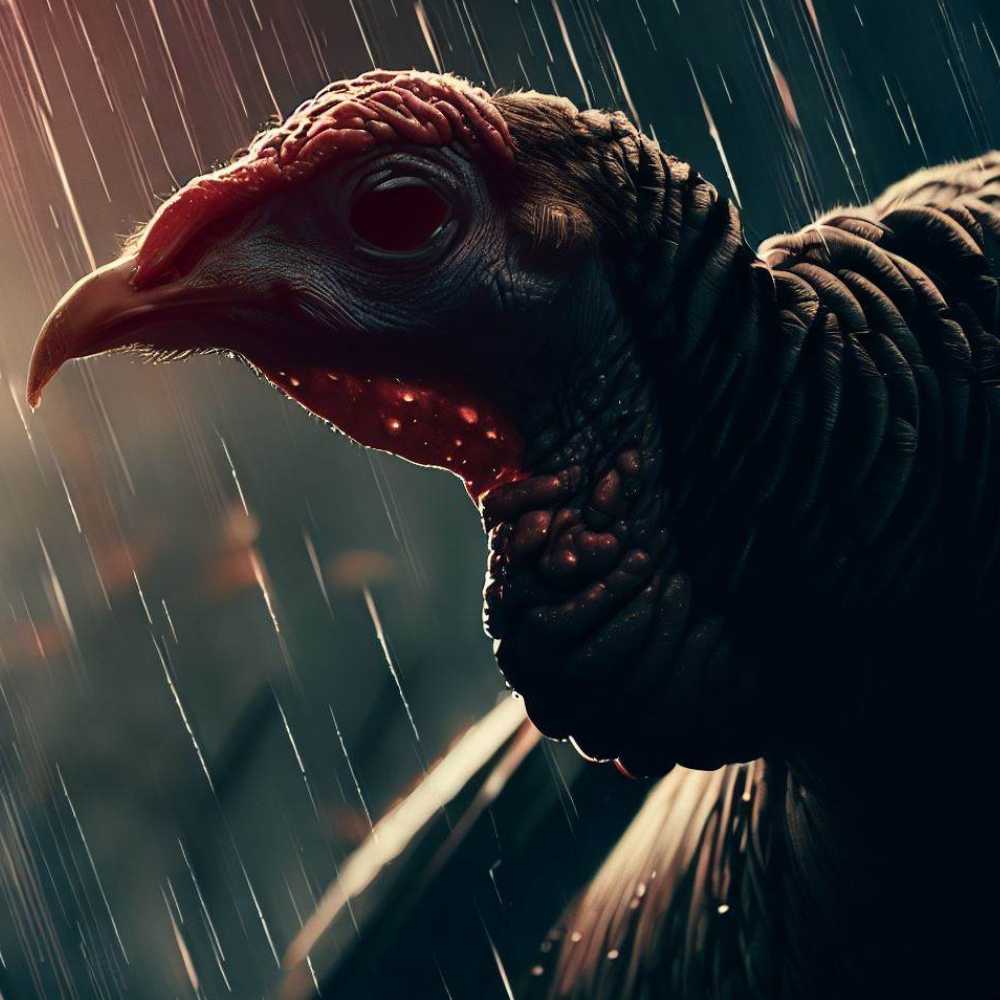The Ultimate Test of Your Hunting Skills: Turkey Hunting in Rain
Don't let a little rain keep you from your turkey-hunting goals. Follow our expert advice and you'll be well on your way to a successful hunt, rain or shine.
Turkey Hunting in the rain can be challenging but highly rewarding if you take the right precautions and approach the hunt patiently and cautiously.
Here's what you need to know if you plan to go turkey hunting on rainy days:
- Choose the right clothing: Wear waterproof and breathable boots to prevent overheating and sweating.
- Pay attention to your gear: Keep your firearm, bow, and arrow dry to prevent jamming or misfiring. Use a waterproof cover for your equipment to keep them dry.
- Use turkey calls strategically: The sound of rain can amplify your turkey calls but also dampen the sound. Experiment with different calls and volumes to find the best for rainy conditions.
- Be patient and persistent: Turkeys tend to seek shelter in the rain, so you may need to wait longer and hunt harder to spot them. Stay focused and be alert for movement or sounds in the area.
The Benefits and Risks of Hunting in the Rain
Hunting turkey in bad weather conditions can be an exhilarating experience if the proper precautions are taken. There can be added benefits to hunting in the rain, such as turkey being more active during wet days with drizzle.
However, some risks associated with hunting in the rain should be noted prior to going out. Let's dive deeper into the risks and rewards of hunting in the rain.
The benefits of hunting in the rain
Rainy weather can offer several advantages to turkey hunters, making it a great time to hunt. However, hunting in the rain also has some risks. It is necessary to weigh the benefits and risks before heading out for the hunt.
The risks of hunting in the rain
Regarding turkey hunting in the rain, there are benefits and risks to consider before you head out into the field. While rain can help mask your noise and scent, improving your chances of a successful hunt, there are also some significant risks to remember.
One of the main risks is hypothermia, especially if caught in a downpour without proper rain gear. Wet clothes can also be uncomfortable and cause chafing, creating an unpleasant experience.
Moreover, rain can be a double-edged sword, as rain can both hinder or help turkeys move around. If the rain is too heavy, they are more likely to nest and stay put, making them harder to track. However, if it is light rain, they are likely to move more freely and could be easier to spot.
Overall, while hunting in the rain can be fruitful, hunters must balance the risks and benefits before embarking on this type of hunt. It is always important to plan and prepare for every circumstance before heading out, taking all necessary precautions to ensure a safe and successful hunting experience.
Ready for the hunt of a lifetime? Our comprehensive Hunting Plan is your first step to success.
Safety precautions to take when hunting in the rain
Hunting in the rain can be rewarding, but it also comes with its own set of risks. Here are some safety precautions to take when hunting in the rain:
By taking the proper safety precautions, you can minimize the risks of hunting in the rain and safely enjoy your hunting experience.

Recommended - Turkey Hunting In Spring Season
Strategies for Turkey Hunting in the Rain
Rainy weather can be one of the toughest conditions to hunt in, but with the right strategies, you can still be successful. By understanding the behaviors of turkeys and how steady rain can affect them, you can develop a plan to increase your chances of success.
Here, we'll explain why hunting in the rain can be so difficult and provide some strategies for finding success in these conditions.
Understanding Turkey Behavior in Wet Weather
Understanding turkey behavior in wet weather is crucial for successful turkey hunting in the rain. Here are some strategies to help you adapt to these conditions:
These strategies can improve your chances of a successful turkey hunt in rainy conditions.
Choosing the Right Hunting Gear for the Rain
Regarding turkey hunting in the rain, having the right hunting gear is crucial to ensure a successful hunt. Here are some strategies to consider when selecting hunting gear for the rain:
By selecting the right hunting gear for the rain, you can enhance your turkey hunting experience and increase your chances of success.
Pro tip:
- Always carry an extra pair of dry clothing to replace wet clothing during breaks or weather changes.
- Rainy-day gobblers tend to make less response, so avoid using locator calls to get their position.
Altering Your Hunting Techniques for Wet Conditions
Hunting turkeys in the rain requires a different approach and techniques than hunting under dry conditions. Here are some essential strategies for turkey hunting in the rain.
Preparing for Successful Turkey Hunting in the Rain
Turkey hunting can be a fun and rewarding experience, even in the rain. While hunting in wet conditions can be tricky, preparing the right way can make the most of your experience. In this section, we will discuss how to prepare for a successful turkey hunting trip in the rain.
Scout Your Hunting Area Before You Go
Scouting your hunting area before you go turkey hunting in the rain can greatly increase your chances of a successful hunt.
Here are some tips to follow:
By scouting your hunting area before you go turkey hunting in the rain, you can better prepare for the conditions and increase your chances of success.
Locate the Best Spots for Turkey Hunting in Wet Conditions
When hunting for turkey in the rain, locating the best spots to avoid getting soaked and maximizing your chances of a successful hunt is imperative. Here are some of the best spots for turkey hunting in wet conditions:
Remember to wear waterproof clothing and take extra precautions when hunting in the rain for a safe and successful hunt.
Planning For Adverse Weather Conditions
When planning a turkey hunting trip, preparing for adverse weather conditions, notably rain, is important to increase your chances of success.
Here are a few tips for turkey hunting in the rain:
- Invest in waterproof clothing and shoes to keep you dry and comfortable.
- Choose calls and decoys designed for wet conditions, and use them sparingly.
- Look for areas with natural covers, such as bushes and trees, to shield you from the rain and provide cover for the turkeys.
- Be patient and observe the turkeys' behavior in response to the rain. They may huddle under trees or seek shelter in dry areas, making them easier to spot.
- Lastly, stay safe and avoid hunting during severe weather conditions, such as thunderstorms or heavy winds.
Frequently Asked Questions
Is it safe to hunt turkeys in the rain?
Yes, it is safe to hunt turkeys in the rain. However, you should take extra precautions, such as wearing waterproof clothing and maintaining good visibility while hunting.
Can you call turkeys in the rain?
Yes, you can call turkeys in the rain. However, the sound may not carry as far, so adjust your calling volume accordingly.
What is the best time to hunt turkeys in the rain?
The best time to hunt turkeys in the rain is during periods of light rain or right after heavy rain, when the turkeys may be more active and visible.
What types of hunting equipment are best for rain hunting?
Waterproof clothing, hunting boots, hats, and a waterproof pack to store your hunting gear are essential for turkey hunting in the rain. A shotgun with a waterproof coating or a waterproof cover is also recommended.
How does rain affect turkey behavior?
Rain can improve turkey activity as the rain can cause insects and other prey to move, increasing the turkeys' opportunities for feeding. However, heavy rain may cause turkeys to seek shelter, reducing their visibility.
What should I do if I get lost or separated from my hunting group during a rainstorm?
If you get lost or separated from your hunting group during a rainstorm, stay calm and try to retrace your steps or find a familiar landmark. If you cannot find your way back, seek shelter and wait for rescue.
Final Thoughts and Tips for Turkey Hunting in the Rain
Hunting turkeys in the rain can be a challenging yet satisfying experience for any hunter. Here are some turkey hunting tips to keep in mind during the turkey season:
Following these turkey hunting tips and strategies can increase your chances of a successful and memorable experience in the rain. Happy hunting!

